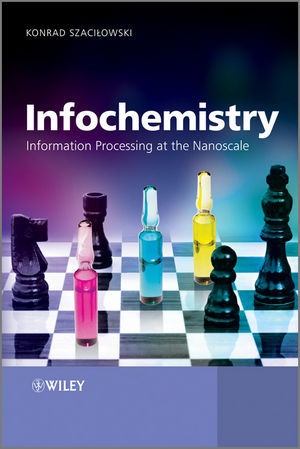Read more
Informationen zum Autor Konrad Szacilowski is Professor of Inorganic Chemistry at AGH University of Science and Technology, and Associate Professor in Chemistry at Jagiellonian University, Poland. His research interests are focused mainly on information processing at the molecular level, surface engineering of nanocrystalline materials, photoelectrochemistry of wide band gap semiconductors, and molecular nanoelectronics. Klappentext Infochemistry: Information Processing at the Nanoscale, defines a new field of science, and describes the processes, systems and devices at the interface between chemistry and information sciences. The book is devoted to the application of molecular species and nanostructures to advanced information processing. It includes the design and synthesis of suitable materials and nanostructures, their characterization, and finally applications of molecular species and nanostructures for information storage and processing purposes.Divided into twelve chapters; the first three chapters serve as an introduction to the basic concepts of digital information processing, its development, limitations and finally introduces some alternative concepts for prospective technologies. Chapters four and five discuss traditional low-dimensional metals and semiconductors and carbon nanostructures respectively, while further chapters discuss Photoelectrochemical photocurrent switching and related phenomena and self-organization and self-assembly. Chapters eight, nine and ten discuss information processing at the molecular level, and eleven describes information processing in natural systems. The book concludes with a discussion of the future prospects for the field.Further topics:* Traditional electronic device development is rapidly approaching a limit, so molecular scale information processing is critical in order to meet increasing demand for high computational power* Characterizes chemical systems not according to their chemical nature, but according to their role as prospective information technology elements* Covers the application of molecular species and nanostructures as molecular scale logic gates, switches, memories, and complex computing devicesThis book will be of particular interest to researchers in nanoelectronics, organic electronics, optoelectronics, chemistry and materials science. Zusammenfassung Infochemistry: Information Processing at the Nanoscale, defines a new field of science, and describes the processes, systems and devices at the interface between chemistry and information sciences. The book is devoted to the application of molecular species and nanostructures to advanced information processing. Inhaltsverzeichnis Preface xi Acknowledgements xiii 1 Introduction to the Theory of Information 1 1.1 Introduction 1 1.2 Definition and Properties of Information 2 1.3 Principles of Boolean Algebra 4 1.4 Digital Information Processing and Logic Gates 7 1.4.1 Simple Logic Gates 7 1.4.2 Concatenated Logic Circuits 10 1.4.3 Sequential Logic Circuits 11 1.5 Ternary and Higher Logic Calculi 14 1.6 Irreversible vs Reversible Logic 16 1.7 Quantum Logic 18 References 20 2 Physical and Technological Limits of Classical Electronics 23 2.1 Introduction 23 2.2 Fundamental Limitations of Information Processing 24 2.3 Technological Limits of Miniaturization 27 References 34 3 Changing the Paradigm: Towards Computation with Molecules 37 References 53 4 Low-Dimensional Metals and Semiconductors 63 4.1 Dimensionality and Morphology of Nanostructures 63 4.2 Electrical and Optical Properties of Nanoobjects and Nanostructures 70 4.2.1 Metals 70 4.2.2 Semiconductors 84 4.3 Molecular Scale Engineering of Semiconducting Surfaces 96 4.3.1 Semiconduc...

